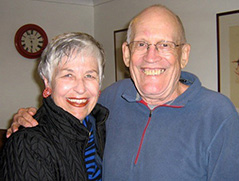 By
Linda McSweeny
By
Linda McSweeny
Death can be a thorny topic to discuss, so, many people just don’t talk about it. But having the opportunity to say goodbye and spend time with family and friends when we know we are dying can impact lives immeasurably and offer some comfort and support at a time when all else may seem unbearable.
Once the conversation begins and you start looking around, there’s a plethora of information to guide you as you contemplate your wishes and share them with the people in your sphere.
If you are dying, there are usually practical things to discuss with family and friends on top of attending to emotional and spiritual needs.
Formal counselling services are often offered as part of palliative care. These can help put people on track to bring up the subject of dying with family and friends or simply to ponder their own situation. In the community, some of us are connected to cultural, religious or secular groups that can help us start discussions around dying.
If the thought of a frank conversation with your inner circle about dying is overwhelming, there are some quirky, less scary ways to go about it that can help give people ideas about how to plan for death and to say goodbye.
Less traditionally, death cafes have arrived in Australia. Macabre as they may sound, they bring to the table dialogue about something we all must face: our lives will end.
The idea is for people to gather for tea or coffee, a treat and a chat about death and dying. The global death cafe movement has been gathering steam in Australia in recent years and for good reason. Similar concepts include Death Over Dinner, a dinner meeting to discuss death and dying.
If attending a death cafe or Death Over Dinner is too much to grapple with, play to your own tune and write a letter, song or poem or set up your own webpage to share thoughts and ideas. Or approach your local pastoral carer or priest, depending on what sits well with you. Some people find solace in prayer or meditation or spending time with like-minded people for nurturing.
When Sharyn Smith’s mother, Roslyn, decided she didn’t want any more treatment for advanced melanoma, she was quite open with her family about her decision and the fact that she was going to die.
“She had had two friends go through the last stages of cancers where they were really ill from treatment. I think she wanted to be in control of how she spent her last days,” says Sharyn. “It gave her the opportunity to spend time with her family and friends with her impending death acknowledged. She was able to say her goodbyes and let us know how much she loved us.
“She wrote me the most beautiful letter, something I treasure. And I know she wrote letters to many of her friends.
“My mum was also a very practical woman. Always more concerned about everyone else. Dad looked after her at home until the last few days, and before she became too ill, she taught him to cook some of his favourite dishes.
“Being able to stay at home until the last couple of days, with the help of community nurses, meant Dad was able to spend more time with her.
“She also spent time with a close friend choosing music for her funeral and had organised where her wake would be held.”
While Sharyn says she didn’t have open discussions about dying with her mother, knowing her mother had made the decision to end treatment and was comfortable with dying made it easier to spend quality time together towards the end.
“I feel really grateful for that time with her,” says Sharyn.
 For Mary Boland and her husband, Michael Anderson, having access to palliative care and information about dying and death was reassuring when Michael’s ocular melanoma metastasised and his chemotherapy ended. In particular, Mary says the practical tips and advice from the nurses helped enable her to care for Michael at home to allow him to have “a good death”.
For Mary Boland and her husband, Michael Anderson, having access to palliative care and information about dying and death was reassuring when Michael’s ocular melanoma metastasised and his chemotherapy ended. In particular, Mary says the practical tips and advice from the nurses helped enable her to care for Michael at home to allow him to have “a good death”.
“The worst day was when we got the last scans and the last chemo was making no effect on the tumours and Michael’s oncologist said there was no point in continuing,” says Mary.
“The oncologist got up and gave him a hug and a kiss and we walked out of the hospital and we just knew what that meant. I remember Mike saying to me ‘how can anyone do this alone?’ He thought it would have been really hard for someone to do it alone. So we came home and started getting ready for him to die.”
Mary says Michael – who died in 2010, aged 68 – wasn’t scared of death itself but had been in a mental rage at the loss of his life given the couple would lose their old age together and he was angry that he’d die when their daughter was just 21. He tried meditation and briefly saw a counsellor, while palliative care at home enabled him to spend time with his family and friends when he knew he was dying.
“Death isn’t optional for any of us and we all have a choice as to how we will handle our own deaths,” says Mary, a retired psychologist who advocates planning before death in the event of severe illness.
“Most people would prefer to be just taken out quickly, I think, but if you’re not, you’ve got to prepare for it. I can’t tell you how important it was for us – the sense of confidence in planning about your death,” says Mary.
“The fact that he died was awful but he had a really good death. I can remember thinking if I had to die like this, that’s how I want to die – at home, with someone you love, in their arms. It was palliative care that made that possible.”
How to cope with death
People facing death will likely feel a range of emotions, including shock, fear, anger and helplessness, and may experience anxiety and depression. There may be worries about family and finances. Other people may not know how to handle the news. Everybody reacts differently and none of us know how we’ll react until we face it.
Palliative care teams can offer access to social workers and counselling services to help patients and the people around them find comfort and hope at various stages of illness, including end of life.
How do I tell people?
It’s up to you when to tell people you are dying, but counsellors suggest choosing a quiet time and place. You can decide how much information you want to share. Be prepared that others may get very upset and you may be the one to comfort them.
Will children cope with the news?
Explaining to children that someone else close to them will die can seem immensely difficult, but it’s vital that they are told what’s happening, in terms they understand. Honesty and simple explanations are the keys when talking with children about dying. It may help to have another adult there for the conversation. Psychological support or play therapy can also be valuable.
Finding hope
Hope may not be a word you associate with dying but it’s tied in with hopes for a ‘good death’. Studies show that people can feel more hopeful about their illness and situation when their medical team involves them in decision-making and choosing pain management tools. You can also try to find hope in how you will spend the time you have before you die – planning special times with family and friends.
Living with dying
Living with dying is a term described as knowing you’re dying but trying to balance that with still trying to live in the moment, as fully as possible. Some days will be easier than others. For example, you may not have energy to go for long walks but may be able to walk your dog around the block some days.
More information
For more practical information about dying, download our book Facing End of Life.
Cancer Council NSW offer a range of support services for cancer patients and their carers and families, including counselling, telephone and face-to-face support groups:
Find support services for cancer patients.
Find support services for carers, friends and family.
Find out about legal and financial assistance.
Find more information about advanced cancer and palliative care.
Call Cancer Council 13 11 20 Information and Support to speak to a specialist cancer professional.